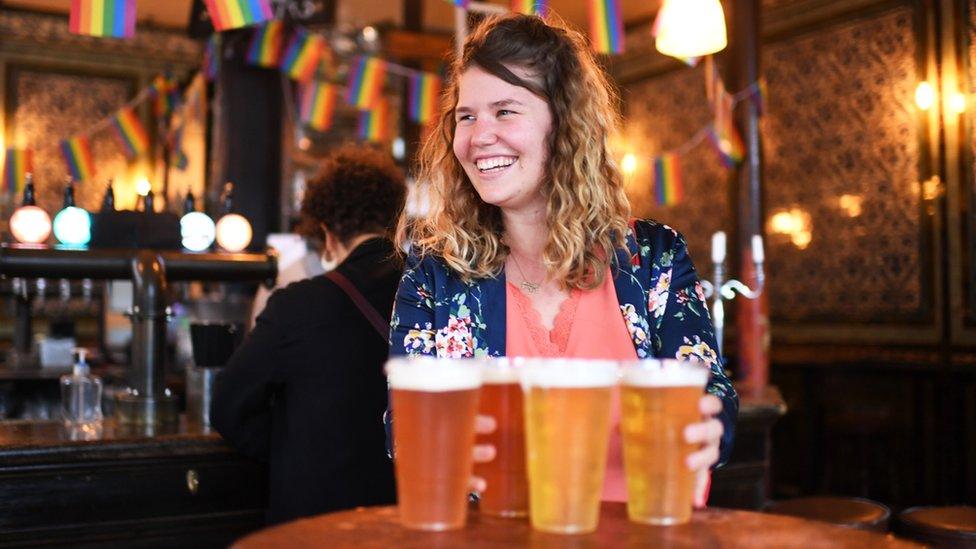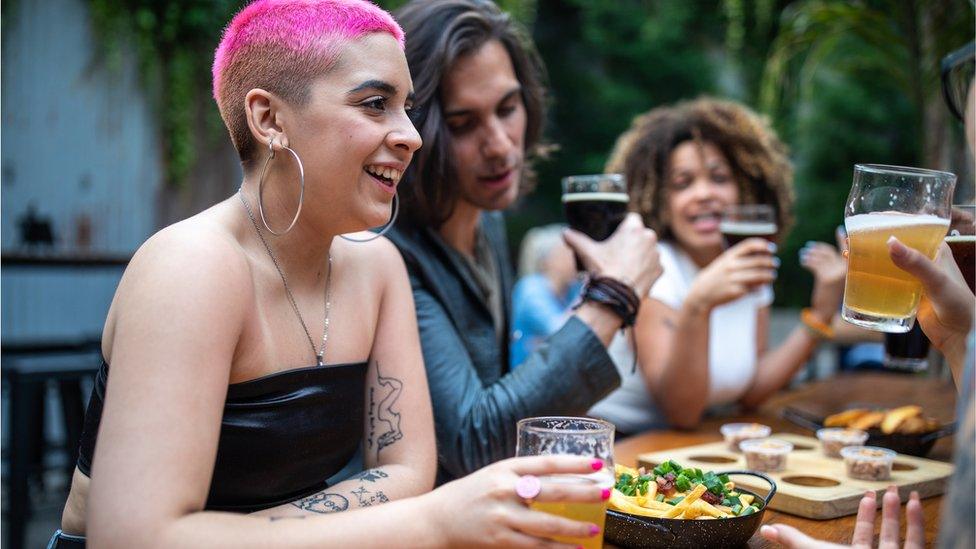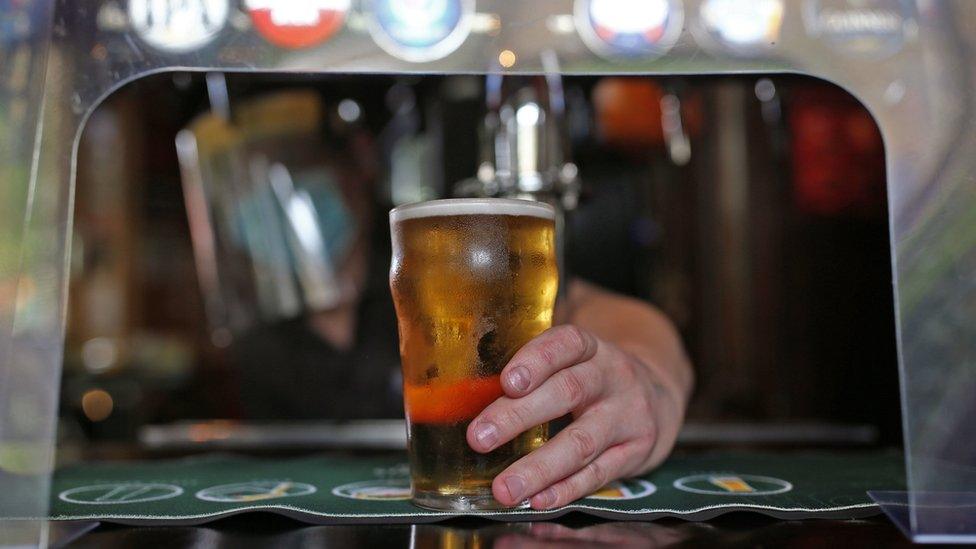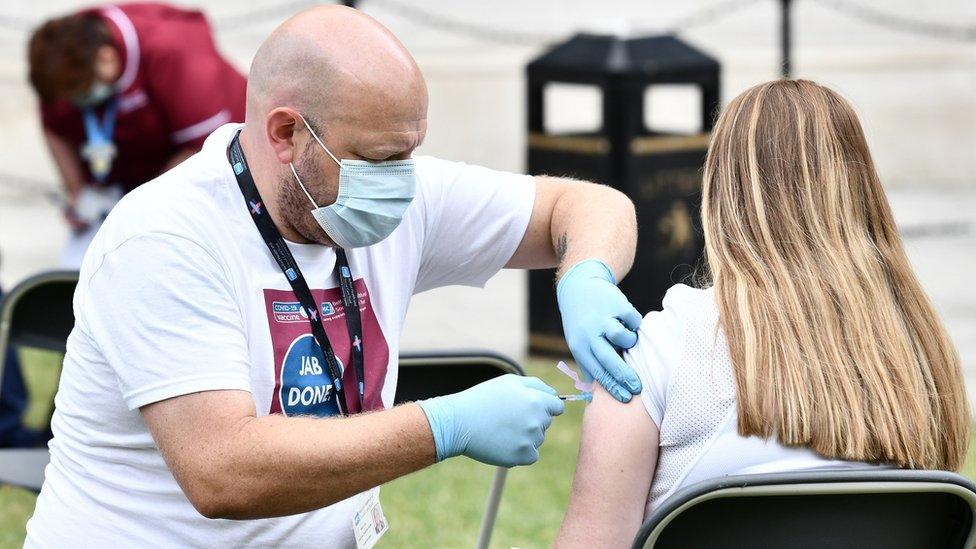Covid-19: Irish Cabinet agrees to end most restrictions by 22 October
- Published

Indoor venues will be allowed to have 60% capacity for events for people who are vaccinated
The Irish Cabinet has agreed on a plan that would effectively end most Covid-19 restrictions by 22 October.
The cabinet said the easing of rules is dependent on 90% of adults being vaccinated and Covid-19 cases remaining manageable.
From 6 September, large crowds will be allowed to gather for religious ceremonies.
Places of worship and outdoor sporting venues will also be allowed to hold 50% capacity from that date.
Indoor venues will be allowed to have 60% capacity for events for people who are vaccinated, while outdoor venues can hold 75% capacity for vaccinated people.
The wearing of face masks will still be mandatory on public transport and in health and retail sectors.
Live music will be allowed to be played indoors at weddings and in bars.
Within the tourism industry, coaches will be able to carry 75% capacity from 6 September.
From 20 September, a phased return to the workplace will begin.
Indoor after-school activities could also resume on that date along with sports played indoors.
From 1 September public transport can return to 100% capacity.
Sections of society "can begin to hope again", says Micheál Martin
Taoiseach (Irish Prime Minister) Micheál Martin said the government hopes to remove legal requirements to prove immunity to access indoor hospitality from 22 October.
He said all remaining restrictions on indoor and outdoor events and activities will be removed from that date.
He added that all remaining restrictions on religious or civil ceremonies will also be removed.
Restrictions on high-risk activities, including nightclubs, will be lifted from 22 October.
The legal requirement will be removed for mask wearing outdoors and in indoor, private settings.
Requirements for physical distancing and limits on numbers that can meet in private homes and gardens will also be lifted.
'Uncertainties remain'
Mr Martin stressed "the pandemic is not over" and "particularly with the delta variant, great uncertainties remain".
He said healthcare settings face "a difficult winter" and other respiratory viruses including cold and flus "may be more impactful and people may be more susceptible to them after reduced exposure of last year".
"If a new dangerous variant of concern emerges or hospitals come under unsustainable pressure we will move quickly to respond to the situation.
"It is very unlikely to ever be able to say we are rid of this virus completely and we expect to see an increase in case numbers over the coming weeks."
He said a winter Covid-19 booster vaccination programme will commence in the coming weeks.
'Broadly comfortable'
He added that close to 90% of all adults over 18 have been fully vaccinated and the rate of uptake in citizens under the age of 18 was "hugely encouraging".
Speaking ahead of the Irish Cabinet meeting on Tuesday, Irish Health Minister Stephen Donnelly said the two-metre rule would be eased depending on the requirement of individual sectors.
"Obviously the sectors most effected have been very loud," he said.
He said that the "majority" of sectors were "broadly comfortable" with the government's indicative dates of reopening.
September timeline:
From 1 September public transport return to 100% capacity
From 6 September, easing of restrictions on organised indoor and outdoor events / mass gatherings
From 20 September, easing of restrictions on indoor and outdoor group activities (sports, arts, culture, dance classes etc)
Attendance at work for specific business requirements may commence on a phased and staggered attendance basis from 20 September.
From October 22 the following restrictions will be lifted:
Requirements for physical distancing
Requirements for mask wearing outdoors and in indoor private settings
Limits on numbers at indoor and outdoor events and activities
Restrictions on religious or civil ceremonies
Limits on numbers that can meet in private homes/gardens
Certification of vaccination, immunity or testing as a prerequisite for access to, or engagement in, any activities or events (with exception of international travel)
Restrictions on high-risk activities (i.e. nightclubs)
Related topics
- Published6 August 2021

- Published21 July 2021

- Published3 August 2021
